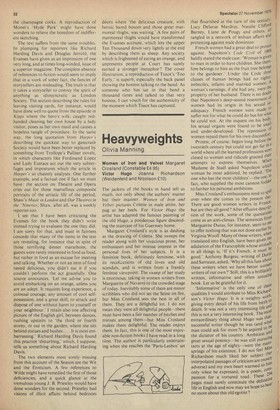Heavyweights
Olivia Manning
Women of Iron and Velvet Margaret Crosland (Constable £4.95) Victor Hugo Joanna Richardson (Weidenfeld and Nicolson £10) The jackets of the books in hand tell us much, not only about the authors' matter but their manner. Women of Iron and Velvet pictures Colette in male attire, her pug at her heels. For Victor Hugo the artist has adapted the famous painting of the old Hugo, a ponderous figure descending the staircase of his Guernsey home.
Margaret Crosland's style is as dashing as the drawing of Colette. She sweeps the reader along with her vivacious prose, her enthusiasm and her intense interest in the personal lives of her subjects. It is a feminine book, deliciously feminine, with its recolctions of old loves and old scandals, and is written from a frankly feminist viewpoint. The sweep of her study is enormous, taking in women writers from Marguerite of Navarre to the crowded stage of today. Inevitably some of them are minor scribblers who did not set the Seine on fire, but Miss Crosland sees the best in all of them. They are a delightful lot. I do not mean they were all delightful people—there must have been a fair number of bitches and minxes among them--but Miss Crosland makes them delightful. The reader enjoys them. In fact, this is one of the most enjoyable non-fiction books I have read in a long time. The author is particularly entertaining when she reaches the 'Paris-Lesbos' set
that flourished at the turn of the century : Lucy Delarue Mardrus, Natalie Clifford
Barney, Liane de Pougy and others, all tangled in a network of lesbian affairs ahd protesting against male dominion. French women had a great deal to protest against. Napoleon's Code Civil of 1804 baldly stated the male case: 'Woman is given to man in order to have children. She there.
fore belongs to him as the fruit tree belongs
to the gardener.' Under the Code three classes of human beings had no rights: imbeciles, infants and married women. A
woman's earnings, if she had any, were the property of her husband. There is no doubt that Napoleon's deep-seated resentment 0. women had its origin in his sexual in' adequacy. French women were made t° suffer not for what he could do but for what
he could not. At the inquest on his bodY, his sexual organs were found to be small
and under-developed. The repression 01
women repaid them for his own discomfort. Protest, of course, began long before the twentieth century but could not get far 01 3
world where all the learned professions Wei!
closed to women and ridicule greeted their attempts to express themselves. Whehil Madame de Stael asked Napoleon whic" woman he most admired, he replied. 'The one who has the most children'--the one, 111 fact, who supplied the most cannon fodder to further his personal ambitions. Miss Crosland's enthusiasms tend to sPill over when she comes to the present day' There are good women writers in France, but are they all good ? After effusive descra' tion of the work, some of the quotations
come as an anti-climax. The sentences from
Marguerite Duras, for instance, seem to me to offer nothing that was not done earlier bY Virginia Woolf. Many of these writers, whell translated into English, have been given the adulation of the Francophile whose attitude
in all things is, 'If it's French, it must he
good.' Anthony Burgess, writing of Duras and Sarraute, asked, 'Why all this fuss about these writers when we have better worn writers of our own ?' Still, this is a brilliantlY written, informative and often amusing book. Let us be grateful for it. 'Informative' is the only one of these qualities I would attribute to Miss Richard' son's Victor Hugo. It is a weighty vork' giving every detail of his life from birth Id° death. It was not a very interesting life 3r1 t this is not a very interesting book. The rh°5 extraordinary thing about Hugo was that; successful writer though he was (and wh`l man could ask for more?) he aspired to be, the dictator of his country. Ambition an° great sexual potency--he was still pur5ul0g tarts at the age of eighty—were the ma'.° springs of his existence. I do not feel Miss Richardson much liked her subject (1.1!1.
interpolated passages of crit icism are mostlY
adverse) and my own heart warmed to Win only when he expressed, in a poem. e°11/,,,, passion for a tortured toad. These .2.7 pages must surely constitute the definitivu_ life in English and now may we hope to heal no more about this old egotist ?










































 Previous page
Previous page